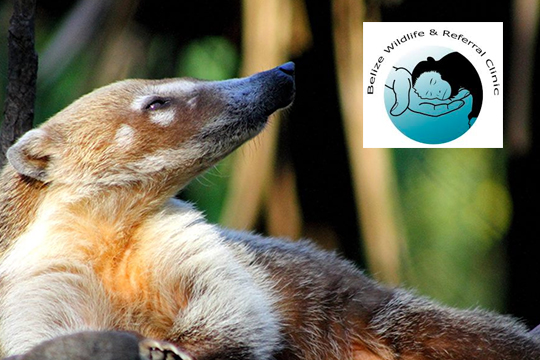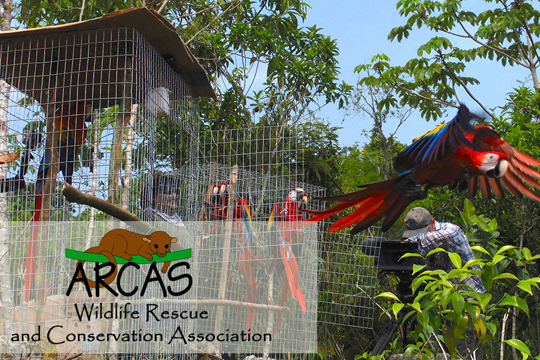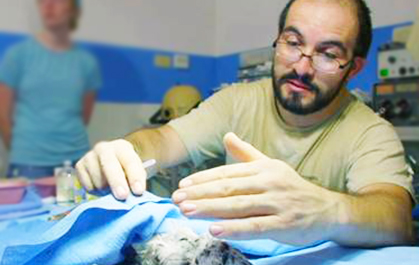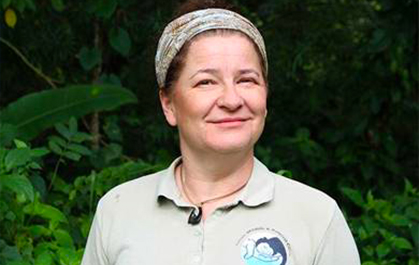
Wildlife Veterinary Medicine and Conservation Certificate
The Introduction to Wildlife Veterinary Medicine and Conservation Online Certificate provides a comprehensive overview of the latest trends and issues in the field of wildlife medicine and rehabilitation.
Participants of this program through Purdue University College of Veterinary Medicine will:
- gain an understanding of the intricacies of wildlife conservation efforts
- understand the process of wildlife rehabilitation
- learn the capture and handling techniques required for the medical care and management of wildlife
- gain insight into the anatomy and physiology of various species
- and develop an understanding for the habits of wildlife and the environmental conditions in which they live.
Taught by two of the top active wildlife veterinarians within the field, this 15-week online certificate program provides an inside look at the day-to-day operations of those who are on the front lines of wildlife conservation within their communities.
Certificate Details
Location: Online
Course Dates: February 15 – May 17, 2026
Duration: 30 hours over the duration
Cost: $750 per person
Who Can Register: Open to all students and professionals
Benefits
- Bolster your resume with an official certificate in Wildlife Conservation and Medicine from Purdue University College of Veterinary Medicine
- Over 30 hours of instruction from two of the top wildlife and conservation veterinarians in the world
- Develop your knowledge on the latest trends in conservation and techniques in wildlife rehabilitation
- Place yourself in a better position to further your career in wildlife conservation and medicine
About the Facilities

The Belize Wildlife and Referral Clinic, Belize
The Belize Wildlife and Referral Clinic (BWRC) is a Belizean non-profit organization founded in 2011.
BWRC’s founder, Dr. Isabelle Paquet-Durand, had for many years provided free medical care to wildlife centers and in the field without a clinic facility and only basic medical equipment. That was before a severely injured monkey named Spartacus provided the impetus to seek funding to establish BWRC. Fortunately Spartacus survived and returned to the wild and BWRC is now a fully staffed veterinary teaching clinic with x-ray, gas anesthesia and ultrasound; for both wildlife and domestics with attached rehabilitation facilities.
BWRC provides veterinary care, rescue assistance, relocation and rehabilitation as well as education and training in support of the governmental wildlife program and around 10 different partner per year.
As of 2018, BWRC has provided free veterinary care to over 2,000 animals with growing numbers annually and between 100-120 students participate in courses or internships per year.
The core mission of the BWRC remains to support wildlife conservation with veterinary care, research and education with an increasing focus on education increased due to the fact that 80% of wildlife intakes originate because of preventable human intervention (traffic and conflict).

The ARCAS Wildlife Rescue, Guatemala
ARCAS was founded in 1989 in order to help combat the illegal wildlife trade in the Petén region. Its first act was to establish the Wild Animal Rescue Center, a direct response to the fact that although the Guatemalan government was beginning to comply with the CITES treaty by confiscating trafficked wildlife, there was no adequate facility to treat and rehabilitate these animals.
Under a cooperative agreement with the Guatemalan government, ARCAS is recognized as the official destination for all confiscated wildlife taken from smugglers in the Mayan Biosphere Reserve.
Since 1990, ARCAS has rescued between 300 to 600 endangered species per year of more than 40 different species.
Program Structure
The program will consist of a series of pre-recorded online lectures, live online labs, and live online discussions on various aspects of wildlife conservation and rehabilitation veterinary medicine totaling 30 hours. Participants will also have the opportunity to access video footage of wildlife releases, surgery recovery updates, and enclosure transitions. Participants in this certificate will be required to choose an internationally relevant wildlife topic of interest to research and present the information in a 5-minute video at the end of the program.
Pre-Recorded Lectures (12 hours)
The pre-recorded lectures provide the opportunity for participants to work at their own pace throughout the certificate program. It is expected that participants write down any questions they might have and ask instructors over email. There are 12 pre-recorded lectures totaling 12 hours.
Live Online Discussion (5 hours)
There are a total of 5 hours of live online discussions during which instructors present on relevant topics within wildlife conservation and rehabilitation medicine. These online discussions allow participants to ask questions and engage with instructors via live discussion. These take place on Sundays at 6:00 p.m. (EST).
Live Online Labs (10 hours)
The live online labs provide an opportunity for participants to gain exposure to cases that our instructors see in the field. There are a total of 6 hours of live online labs, with another 4 hours of pre-recorded surgeries or wildlife releases; totaling 10 hours. These labs consist of necropsies, bone puzzles, as well as an inside look into the rehabilitation process. These take place on Sundays at 6:00 p.m. (EST).
Exclusive Video Footage of Wildlife Rehabilitation Process (3+ hours)
Since our instructors are practitioners within the field, they are continually encountering new cases and finding innovative ways to solve them. You have the opportunity to see of them in action, as they upload content on their day-to-day operations as well as updates on recoveries for some of their patients in their respective clinics.
Common Questions
30 hours over the duration of the course.
$750 per person
Group Rates
- Groups of 10-20: 20% discount per participant
- Groups of 20+: 25% discount per participant
This introductory course is open to any and all individuals who are interested in this program.
The program will consist of a series of pre-recorded online lectures, live online labs, and live online discussions on various aspects of wildlife conservation and rehabilitation veterinary medicine totaling 30 hours. Participants will also have the opportunity to access video footage of wildlife releases, surgery recovery updates, and enclosure transitions. Participants in this certificate will be required to choose an internationally relevant wildlife topic of interest to research and present the information in a 5-minute video at the end of the program.
- Pre-Recorded Lectures (12 hours)
- The pre-recorded lectures provide the opportunity for participants to work at their own pace throughout the certificate program. It is expected that participants write down any questions they might have and ask instructors over email. There are 12 pre-recorded lectures totaling 12 hours.
- Live Online Discussion (5 hours)
- There are a total of 5 hours of live online discussions during which instructors present on relevant topics within wildlife conservation and rehabilitation medicine. These online discussions allow participants to ask questions and engage with instructors via live discussion. These take place on Sundays at 6:00 p.m. (EST).
- Live Online Labs (10 hours)
- The live online labs provide an opportunity for participants to gain exposure to cases that our instructors see in the field. There are a total of 6 hours of live online labs, with another 4 hours of pre-recorded surgeries or wildlife releases; totaling 10 hours. These labs consist of necropsies, bone puzzles, as well as an inside look into the rehabilitation process. These take place on Sundays at 6:00 p.m. (EST).
- Exclusive Video Footage of Wildlife Rehabilitation Process (3+ hours)
- Since our instructors are practitioners within the field, they are continually encountering new cases and finding innovative ways to solve them. You have the opportunity to see of them in action, as they upload content on their day-to-day operations as well as updates on recoveries for some of their patients in their respective clinics.
- Bolster your resume with an official certificate in Wildlife Conservation and Medicine from Purdue University College of Veterinary Medicine
- Over 30 hours of instruction from two of the top wildlife and conservation veterinarians in the world
- Develop your knowledge on the latest trends in conservation and techniques in wildlife rehabilitation
- Place yourself in a better position to further your career in wildlife conservation and medicine
Questions?
If you have any questions, please contact the Global Engagement Office.
Email: pvmglobal@purdue.edu
Phone: 765-494-5780



